Congress
Rep. Garcia urges Feds to protect LGBTQ+ people during Pride
“Ensuring that people can peacefully and safely celebrate Pride and the diversity of the LGBTQ+ community is of utmost importance”

WASHINGTON – U.S. Rep. Robert Garcia (D-Calif.) on June 12 sent a letter to Secretary of State Antony Blinken, Homeland Security Secretary Alejandro Mayorkas, and Federal Bureau of Investigation Director Christopher Wray to work to ensure LGBTQ people during Pride events.
“Over the last several weeks, your respective agencies and departments have issued stark warnings, and travel advisories to the public over potential threats from foreign terrorist organizations (FTO), and their supporters during this year’s Pride Month,” said Garcia in his letter. “I understand that these steps have come after deeply concerning increases in anti-LGBTQ+ rhetoric, calls for targeted violence, and foiled violent plots.”
The FBI on May 10 issued an advisory that warned of potential violence at Pride events and other LGBTQ-specific events. The State Department on May 17 — the International Day Against Homophobia, Biphobia, and Transphobia — announced a similar warning.
“Ensuring that people can peacefully and safely celebrate Pride and the diversity of the LGBTQ+ community is of utmost importance,” wrote Garcia, a gay man who represents California’s 42nd Congressional District that includes Long Beach.
June 12 also marked eight years since a gunman killed 49 people inside the Pulse nightclub in Orlando, Fla.
The massacre at the time was the deadliest mass shooting in modern U.S. history. The gunman pledged his allegiance to the Islamic State, even though there is no evidence that suggests the extremist group ordered him to carry out the massacre.
“This week marks the eight (sic) anniversary of the horrific Pulse nightclub Orlando shooting — during which the attacker deliberately and viciously targeted the LGBTQ+ community,” wrote Garcia in his letter. “It is important to put the recent escalation of extremist anti-LGBTQ+ propaganda and messaging in the context the Pulse nightclub shooter who was influenced by these same forces of extremism.”
Congress
EXCLUSIVE: Alex Padilla, wife Angela talk LGBTQ mental health
Couple to receive award from Gay Men’s Chorus of Los Angeles on Sunday

U.S. Sen. Alex Padilla (D-Calif.) and his wife, Angela Padilla, spoke with the Washington Blade for an exclusive interview last week ahead of their receipt of Voice Awards from the Gay Men’s Chorus of Los Angeles at a ceremony on June 30.
“I’ve known members” of the organization “off and on over the years, going back to my days on the city council in Los Angeles,” when battles were waged over California’s Proposition 8 banning same-sex marriage, Padilla said.
“I was proud to be an ally for a long time, but especially in those moments, really, as a public official, as an elected official, knowing how important allyship was,” he said, stressing “the tremendous talent of the chorus” and “what they represented individually and as a group” serving as allies for “young people who may not necessarily grow up in a supportive environment or in supportive families.”
“I work very closely with Joseph Guardarrama,” a board member for GMCLA, “for many years now on my nonprofit, and it’s all in support of mental health and wellness and educating people on how to get help, why they should get help, and why it’s important to take care of your brain,” Mrs. Padilla said by phone.
“I started FundaMental Change in 2017,” she said, to push for “the mental change that I feel that we have to have as a society when it comes to how we look at [and] how we treat mental health conditions.”
The senator’s wife added that LGBTQ people are twice as likely to have a mental health condition while dealing “with so much more social stigma and discrimination” than their straight and cisgender counterparts.
“This month we’re going to have a table for June 30 working with the [California] Department of Mental Health at the Pride parade,” she added. FundaMental Change also operates an LGBT Youth TalkLine and Trans Lifeline.
Padilla noted the organization’s work combatting stigma. “One thing that we recognize both coming from Latino families is the need to overcome stigma,” he said. “There’s a lot of misunderstanding or misperceptions about mental health.”
The effort is also central to the senator’s work as a policymaker, he said, referencing the bipartisan Senate Mental Health Caucus that he founded alongside U.S. Sens. Tina Smith (D-Minn.), Thom Tillis (R-N.C.), and Joni Ernst (R-Iowa) to serve as “a forum for us to share stories.”
“It’s been fascinating, there are more than 30 members of the caucus now, so about a third of the United States Senate,” he said. “It’s 50/50 Democrats and Republicans,” and when approached, every member had a story to share, whether about “something that they’ve been through [or] somebody in their family, a colleague, a neighbor who can relate.”
Padilla said his decision to announce the formation of the caucus concurrently with his visit to the San Francisco LGBT Community Center “was very intentional.”
When it comes to mental health, “We’ve really prioritized trying to develop bipartisan solutions,” he said, “because those are more sustainable here in Congress.”
The first bill backed by the caucus was Padilla and Tillis’s Local 9-8-8 Response Act of 2023, which “was to require the FCC to move to implement the geolocation technology to the 988 system.”
Unveiled by the Biden-Harris administration in 2022, the 988 Suicide and Crisis Lifeline is operated by the U.S. Department of Health and Human Services Substance Abuse and Mental Health Services Administration. The program provides the option for callers to reach specialized LGBTQI+ affirming counselors by pressing “3.”
On the importance of geolocation technology, Padilla said “if I’m here in Washington, and have a need to call 988, my area code on my phone is Los Angeles — so, I’d be passed through to the Los Angeles providers.”
The senator noted that the FCC “is moving forward with those improvements” independently of his bill’s path forward in Congress.
More broadly, some of the policy challenges concern supply and demand problems. “From a bigger picture, longer term perspective, we’re talking about the workforce needs,” Padilla said. “So, what’s the game plan for [getting] more psychologists or psychiatrists or counselors, more therapists, more everybody in the field to better serve people across the country?”
Padilla also discussed the importance of “cultural competence” as a means of guaranteeing the best possible treatment. “When we ask people to go get help, if there’s somebody that they can relate to or that they know gets them, the better quality experience in treatment is going to come,” he said.
“We’re not quite there yet with the Republican colleagues, but I have faith that in time we will get them there,” the senator added. “And again, the LGBTQ community is a prime example. You’ve got to feel comfortable going to somebody when you need help.”
Padilla said, “not everybody comes from a supportive environment; not everybody lives in a city or a state that is supportive. And at this particular time politically, they’re really under attack. They’re being targeted acutely. And that’s more reason and urgency to speak up and stand up.”
On Sunday, the Padillas will share the stage with the recipients of the third GMCLA Voice Award, from the critically acclaimed HBO series “We’re Here,” which follows drag queens as they travel the country to perform in one-night-only performances in small towns.
Mrs. Padilla celebrated the ways in which drag has brought communities together, recalling when RuPaul’s Drag Race “was first airing and it was like everyone was so interested in watching the show” and “it just brought people from everywhere.”
“I have a lot of frustrations, as a Latina, with the misrepresentation of our community and our culture in television and movies,” she said. “And I feel like every opportunity that you get to see something that’s just authentic — it’s such a benefit to everyone. It really helps us understand that we have more in common than not.”
“Drag is not new,” the senator said. “It goes back generations in the United States and I think for the LGBTQ+ community it can be can be very empowering, as an outlet for performers, but also participants in an audience to see on stage what you may not see in other places.”
Republican-led efforts to restrict access to drag performances, especially by young people, “feels like it’s an act of desperation,” Mrs. Padilla said.
“I think they’re resisting something that they don’t understand. I just think it’s really coming from a place of fear. And really not understanding the human behind it,” she said, adding that the reactionary forces are a product of the LGBTQ movement’s success and “that feeling of it’s out of their control.”
“The diversity of our communities, the diversity of our country, is a big source of strength,” Padilla said. “It’s just not always been embraced. I think a lot of people either misinterpret it or frankly exploit it to cause divisions in society.”
“We can’t ignore the political climate that we’re living in,” the senator said, “heightened only by the fact that it’s a presidential election year and we see who the Republican nominee is going to be.”
Looking ahead to November’s elections, he said, “as with so many other issues, LGBTQ+ rights and opportunity in the future — It’s a 180-degree difference between Joe Biden and Donald Trump. Let’s not take it for granted. Let’s not take it lightly. Let’s get out and vote.”
Congress
EXCLUSIVE: Markey bill would offer additional support to LGBTQ elders
Measure would create Office of LGBTQI Inclusion within HHS
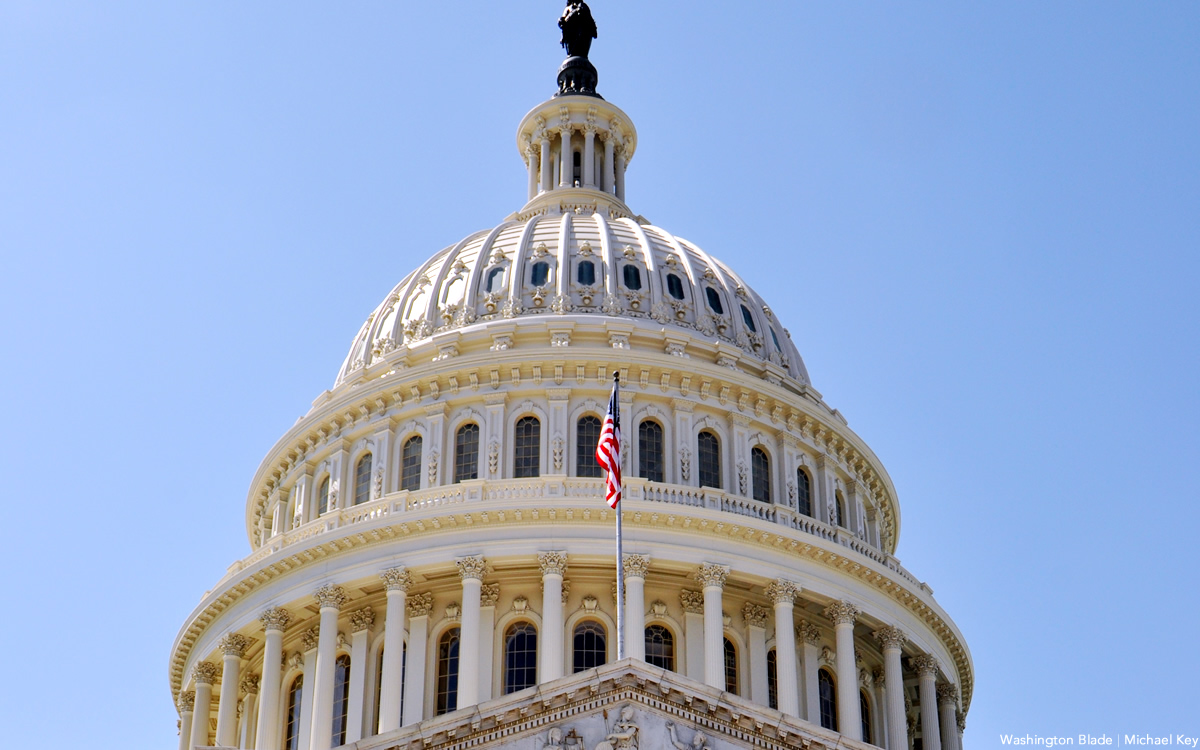
U.S. Sen. Ed Markey (D-Mass.) will introduce a bill on Friday to support LGBTQ elders and older adults living with HIV by establishing an Office of LGBTQI Inclusion within the U.S. Department of Health and Human Services.
Among other responsibilities, the office would advocate, coordinate activities, issue policy recommendations, and oversee the collection of data from these communities.
A major piece of the work to improve health equity at HHS under the leadership of Secretary Xavier Becerra and Assistant Health Secretary Rachel Levine has been data collection initiatives for LGBTQ and other populations that can encounter barriers accessing care.
The Elder Pride Act will also “establish a rural grants program to serve the unique needs of rural LGBTQI+ older adults, including through education and training, community outreach and creation of community spaces, and improved cultural competency,” according to a press release announcing the legislation, which the senator’s office previewed exclusively with the Washington Blade.
“After years of exclusion and discrimination from health care settings, workplaces, and their local communities, LGBTQ+ older Americans deserve the protections their neighbors are afforded,” Markey said.
“Queer and trans elders should be able to age with dignity, grace, and surrounded by community,” he added. “The Elder Pride Act will ensure that all older adults are able to have access to the care and services they need.”
Cosponsoring senators include Bob Casey (D-Penn.), Ron Wyden (D-Ore.), Alex Padilla (D- Calif.), and Tammy Baldwin (D-Wis.). The legislation’s provisions were included in a pair of bills introduced earlier this year by U.S. Rep. Suzanne Bonamici (D-Ore.), who chairs the Congressional Equality Caucus’s Aging Issues Task Force.
The press release from Markey’s office also highlights several of the challenges faced by LGBTQ older adults vis-a-vis their cisgender and heterosexual peers: Fewer sources of support. higher poverty rates, poorer healthcare, poorer health access, and poorer health outcomes.
At the city and county level, older adults are served by local area agencies on aging (AAAs), which receive services and activities from HHS. Fewer than half of these organizations report that they will be able to provide LGBTQ-specific activities by the time the population of LGBTQ elders reaches 7 million, which is expected by 2030.
Congress
House Republicans pass NDAA with anti-LGBTQ riders
U.S. Rep. Robert Garcia (D-Calif.) slammed Republican U.S. Rep. Josh Brecheen’s (Okla.) effort to ban drag shows on American military bases

WASHINGTON — U.S. Rep. Robert Garcia (D-Calif.) slammed Republican U.S. Rep. Josh Brecheen’s (Okla.) effort to ban drag shows on American military bases during a debate over the annual National Defense Authorization Act spending bill on Thursday.
The appropriations package, which contains five anti-LGBTQ riders pushed by House GOP members, was passed on Friday.
“We know there are a lot of threats to the health and well-being of our service members and their families: poisoned water, toxic mold in military housing, PTSD, and suicide,” said Garcia, who is gay and a co-chair of the Congressional Equality Caucus.
“So I’m stunned to see that the Republican idea to protect our troops is to ban drag shows,” he said. “Mr. Speaker, my Republican colleagues want us to believe that ‘these gays are trying to murder us.’ They want us to believe that drag is harmful, or immoral and wrong. This is ridiculous.”
“We can document and celebrate drag shows on military bases since the late 1800s, and through both world wars,” Garcia continued. “The USO and the Red Cross supported drag during World War II. That’s right: the Army that defeated Hitler and saved the world included drag queens.”
“Ronald Regan starred in a movie called ‘This Is the Army!’ — a movie about World War II that featured four drag performances,” he said. “And he’s not the only Republican president who knew that drag can be fun and sometimes silly.”
Garcia displayed a photo of former president and presumptive 2024 GOP nominee Donald Trump alongside former New York Mayor Rudy Giuliani, who was dressed in drag.
“Mr. Speaker,” the congressman said, “drag is Art. Drag is Culture. Drag is Creativity. Drag is Comedy. And no, drag is Not a Crime. It’s not pornography. The real obscenity is when one of our colleagues, the gentlewoman from Georgia, shows literal posters of revenge porn in our Oversight Committee! If we want to end porn in government facilities, let’s ban that.”
In a statement on Friday, the Equality Caucus called out House Republicans’ politicization of the military appropriations bill.
“Like last year, House Republicans voted to add poison pill, anti-LGBTQI+ provisions to the NDAA that discriminate against our LGTBQI+ servicemembers and their families,” said Caucus Chair U.S. Rep. Mark Pocan (D-Wis.) “The Equality Caucus remains committed to preventing these discriminatory provisions from becoming law.”
Along with Brecheen’s drag show ban, the caucus highlighted four of these riders from this year’s NDAA:
- Amendment 46 by U.S. Rep. Greg Steube (R-Fla.), which would “prohibit funds for the Department of Defense Education Activity from being used to purchase, maintain, or display in a school library or classroom books that include transgender and intersex characters or touch on topics related to gender identity or variations in sex characteristics,”
- Amendment 49 by U.S. Rep. Cory Mills (R-Fla.), which would “ban Pride flags from any workplace, common access area, or public area of the Department of Defense,” and
- Amendments 52 and 53 by U.S. Reps. Matt Rosendale (R-Mont.) and Ralph Norman (S.C.), which would, respectively, “ban TRICARE from covering and furnishing gender-affirming surgeries and hormone treatments,” and “prohibit the Exceptional Family Member Program (EFMP) from covering or providing referrals for “gender transition procedures”—including puberty blockers, hormone therapy, and surgeries—for servicemembers’ dependent minor children.”
Congress
Equality Caucus, White House condemn anti-LGBTQ riders in bill
“Once again, Republicans are attacking the trans & LGBTQ+ community with riders that harm LGBTQI+ veterans & undermines military readiness”

WASHINGTON — The Congressional Equality Caucus on Wednesday condemned House Republicans’ passage of the Military Construction, Veterans Affairs, and Related Agencies (“MilCon”) Appropriations Act, 2025, with anti-LGBTQ+ riders attached.
“Once again, Republicans are attacking the transgender and broader LGBTQI+ community with riders that both harm our LGBTQI+ veterans and undermine our military readiness by discouraging LGBTQI+ people from enlisting,” said caucus chair U.S. Rep. Mark Pocan (D-Wis.).
“We strongly condemn this bill and its cruel attacks that target those who have served our nation in uniform,” the congressman said. “Our members remain committed to defending the LGBTQI+ community throughout the Fiscal Year 2025 appropriations process and beyond.”
The White House said on Monday that President Joe Biden would veto the House version of the MilCon bill, with opposition stemming in part from the anti-LGBTQ riders along with anti-abortion riders, which would reverse the U.S. Department of Veterans Affairs’ policy of covering abortions in cases of rape or incest. These provisions will almost certainly not be included in the Senate version of the appropriations package.
Also on Monday, the U.S. Office of Management and Budget issued a statement outlining the Biden-Harris administration’s position on the bill, writing: “H.R. 8580 includes numerous, partisan policy provisions with devastating consequences, including harming access to reproductive healthcare, threatening the health and safety of lesbian, gay, bisexual, transgender, queer, and intersex Americans, endangering marriage equality, hindering critical climate change initiatives, and preventing the administration from promoting diversity, equity, and inclusion.”
Two of the four anti-LGBTQ riders would prohibit the use of appropriated funds for “surgical procedures or hormone therapies for the purposes of gender affirming care” and the implementation, administration, application, or enforcement of three executive orders by Biden containing LGBTQ-inclusive diversity, equity, and inclusion initiatives:
- Executive Order No. 13985, “Advancing Racial Equity and Support for Underserved Communities Through the Federal Government”
- Executive Order No. 14035, “Diversity, Equity, Inclusion, and Accessibility in the Federal Workforce;” and
- Executive Order No. 14091, “Further Advancing Racial Equity and Support for Underserved Communities Through The Federal Government”
A third would prohibit the flying of Pride flags over VA facilities and national cemeteries while a fourth would create a “license to discriminate” against LGBTQ people under the pretext of religious liberty.
For instance, the caucus writes, “it prohibits the federal government from reducing or terminating a federal contract or grant with an organization that discriminates against LGBTQI+ people if the organization justifies their discrimination based on the belief that marriage should only be between a man and a woman.”
Likewise, the rider “prohibits the federal government from reducing or terminating the employment of an employee who discriminates against LGBQI+ people if the employee justifies their discrimination based on the belief that marriage should only be between a man and a woman.”
This means a benefits counselor could, without being penalized, refuse to process applications and changes for a veteran’s same-sex spouse, the caucus notes.
On X, the caucus pledged to defeat the anti-LGBTQ riders, noting “we were able to ensure these harmful riders were not included in last year’s final MilCon-VA bill.”
🚨BREAKING🚨
— Congressional Equality Caucus (@EqualityCaucus) June 5, 2024
House Republicans just passed a funding bill loaded with anti-LGBTQI+ riders.
We were able to ensure these harmful riders were not included in last year’s final MilCon-VA bill, and we’re committed to doing so again.
Read our full statement: https://t.co/orotTNGiDn https://t.co/xZOaL6Qefv
Congress
House ethics complaint filed over GOP staffer’s anti-trans email
“You’re disgusting and should be ashamed of yourself. Don’t email me or anyone from my office ever again!”

WASHINGTON — A federal government employee has filed a complaint to the U.S. House Ethics Committee over an email they received from Matthew Donnellan, chief of staff to Republican U.S. Rep. Carol Miller (W.Va.), which contained combative and anti-trans language.
The Washington Blade has seen the correspondence between the parties, in which the confrontation was apparently kicked off when the congresswoman’s top aide received an email that included the sender’s preferred pronouns in the signature box, triggering his reply.
Donnellan wrote, “As a father, it is disgusting that anyone would ever tell my son or daughter that something is wrong with them and they should take sterilizing hormones or have surgery to cut off their genitals.”
“The fact that you support that ideology by putting pronouns in your signature is awful,” he said, adding, “You’re disgusting and should be ashamed of yourself. Don’t email me or anyone from my office ever again.”
A senior government official told the Blade in a written statement that the email was not out of character for Donnellan:
“I’ve heard from two colleagues several months apart about two separate transphobic emails, using identical language, from Matthew. Unfortunately these emails—though inconsistent with the typical collegiality one would expect from a Chief of Staff on the Hill—is likely a reflection of both increased partisanship on the Hill and a rise in anti-LGBTQ rhetoric from the right.
“Not only is this virtual, hate-filled temper tantrum unbecoming of a Chief of Staff, inappropriate, and unprofessional, it also hurts his boss’s constituents. DC is built on congressional staff, members of Congress, and executive officials being able to put aside their differences to find unlikely areas of commonality where they can work together.
“Even some of the most progressive members, like [U.S. Reps. Alexandria Ocasio-Cortez (N.Y.) and Jerry Nadler (N.Y.)] have partnered with some of the most conservative members, like [U.S. Reps. Matt Gaetz (Fla.) and Jim Jordan (Ohio)], respectively, when they can find common ground.
“Matthew’s refusal to work with an agency department or office just because a staffer has pronouns in their signature isn’t just hateful—it means he’s cutting off opportunities to deliver results for his boss’s constituents, especially in a divided Washington.”
Donnellan told the Blade by email that his response to the government employee is “a reply I send to anyone who uses pronouns or pushes gender ideology in any way.”
“No one is ‘born in the wrong body’ and it’s horrific to tell anyone that they need genital mutilation surgery or sterilizing drugs,” he said. “People who push gender ideology, actively or passively, are awful and should be confronted every single time.”
“If the blunt reality of the terrible things that they are pushing is offensive to them then they should strongly reconsider what it this they believe and the harm that they are doing rather than simply trying to conform to liberal luxury beliefs,” Donnellan said.
Addressing the complaint filed against him, Donnellan said, “I haven’t heard anything from Ethics and doubt that I will, they generally don’t waste their time with sheltered progressives being forced into the real world for the first time.”
A House Ethics Committee spokesperson declined to comment when asked if they could confirm receipt of the complaint.
Asked whether Miller might object to the way that she and her Congressional office are represented with these confrontational email exchanges, Donnellan said his boss’s “motto is ‘cut the bull’, and gender ideology is some of the biggest bull there is.”
On Friday, the congresswoman’s son Chris Miller placed third in the Republican primary contest for West Virginia’s gubernatorial race, where the state’s Attorney General Patrick Morrissey secured his party’s nomination in a decisive victory with 33 percent of the vote.
Leading up to the election, trans issues had emerged as a dominant focal point as the GOP candidates squared off against each other, with Miller’s campaign attacking Morrissey with allegations that he had profited from “the trans agenda” and backed a drug company that “helps turn boys into girls” when working as a healthcare lobbyist in Washington.
In one ad that was paid for by a super PAC chaired by his father, Miller said the pronouns used by Morrissey are “money-grubbing liberal,” an interesting charge to level at the conservative Republican attorney general of West Virginia (even notwithstanding the fact that those three words are not pronouns but, rather, nouns and verbs.)
Declaring preferred pronouns in workplace email signatures has become commonplace in both the public and private sector, whether for purposes of sending an affirming message to transgender and gender expansive employees and officers or to mitigate the chances that either they or their cisgender counterparts might be unintentionally misgendered.
The Biden-Harris administration has pushed for agencies to adopt the practice along with other measures and policies to advance the rights and wellbeing of trans and gender expansive employees across the federal government.
In a 2021 announcement of the U.S. Department of Agriculture’s issuance of updated guidance on the agency’s email signature block, Michael Watts, director of civil rights for the U.S. Forrest Service, noted that “There are plenty of gender-neutral names out there, or names from other cultures that might not give you enough information to know their gender.”
While the inclusion of pronouns was not made mandatory at USDA, he urged employees to “strongly consider taking this small but important step toward supporting inclusiveness in the workplace.”
“The use of pronouns in our email signatures and getting into the habit of including pronouns in our introductions doesn’t really cost us anything,” Watts added, arguing that the move constitutes “a meaningful exchange to others and makes it easier for people to be respectful in how they address each other.”
“I just think it’s the right thing to do,” he said.
Official guidance published by the U.S. Office of Personnel Management, which is responsible for administering policies across the U.S. federal civil service, stipulates that agencies should “take steps to provide the option for employees to include the pronouns they use in employee systems and profiles, including email signature blocks, employee directories and employee profiles.”
Some have gone further, such as by adding pronouns to email signatures for all employees, as the U.S. Department of State did in 2023, while others like USDA have established, as official policy, that “employees are encouraged to include their pronouns in the first line of their email signature block (e.g. he/him/his). Signature blocks are a simple and effective way for individuals to communicate their identified pronouns to colleagues, stakeholders, and customers.”
“For example,” the USDA writes, “adding pronouns to signature blocks also has the benefit of indicating to the recipient that you will respect their gender identity and choice of pronouns.”
Congress
Bill to support LGBTQ+ seniors in rural areas reintroduced
“LGBTQ+ elders and older people living with HIV live in every part of this nation & should be able to access services and care”
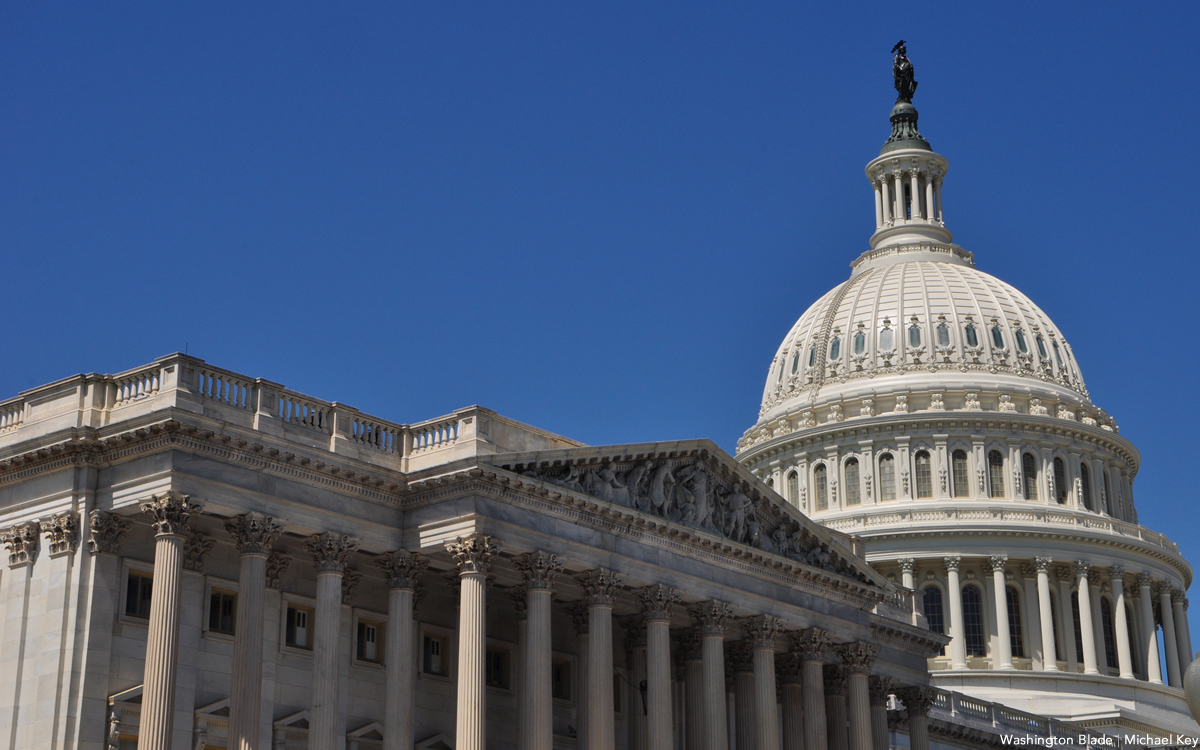
WASHINGTON – Representatives Suzanne Bonamici (D-OR), Mark Pocan (D-WI), and Sharice Davids (D-KS) reintroduced legislation to increase access to needed services and resources for LGBTQ+ seniors who live in rural areas this week.
The Elder Pride Act would bolster the capacity and ability of Area Agencies on Aging (AAA) located in rural communities to better serve and support LGBTQ+ seniors who often require affirming care, services, and supports that are often underfunded and scarce in many parts of the country.
Recent surveys show that between 2.9 million and 3.8 million LGBTQ+ people live in rural American communities.
“LGBTQ+ elders and older people living with HIV live in every part of this nation, including rural areas. We all deserve to be able to age in our communities with the services and supports we need to remain independent,” SAGE CEO Michael Adams said in the press release announcing the reintroduction of the legislation. “We commend Representatives Suzanne Bonamici (D-OR), Mark Pocan (D-WI), and Sharice Davids (D-KS) on reintroducing the Elder Pride Act. And we honor the contributions of our many LGBTQ+ trailblazers whose tireless advocacy allowed us to reintroduce this critical bill. We look forward to working alongside Reps. Bonamici, Pocan, and Davids, and our LGBTQ+ pioneers nationwide to pass this legislation.”
“LGBTQI+ seniors should be able to access services and care that meets their unique needs, regardless of where they live,” said Rep. Bonamici, Chair of the Equality Caucus’ LGBTQ+ Aging Issues Task Force.”Those who live in rural areas frequently face increased barriers, which Congress can break down. The Elder Pride Act will increase resources for programs and services that will improve the lives of LGBTQI+ elders.”
“The Elder Pride Act will improve the overall health and social and economic well-being of LGBTQI+ older adults and seniors living with HIV in rural areas by better equipping senior service providers with resources to address the unique needs of these communities. I’m pleased to introduce this important legislation with my colleagues and co-leaders on the Equality Caucus, Reps. Pocan and Davids,” Bonamici added.
“Rural LGBTQI+ seniors have been lacking access to necessary services and care for too long,” said Pocan, Co-Chair of the Congressional LGBTQ+ Equality Caucus. “The Elder Pride Act creates opportunities for LGBTQ+ seniors in rural communities, benefiting everyone in the region. I look forward to advancing this important legislation.”
“Many of our LGBTQ+ elders fought tirelessly for equality in a world that refused to accept their identity,” said Rep. Davids. “While they overcame tremendous odds to give future generations the rights they deserve, our elders, particularly those in rural communities, continue to face discrimination when accessing long-term care and healthcare. I am proud to support the Elder Pride Act because who you are and who you love should never increase your risk for isolation, poverty, and poor health outcomes as you age.”
The Elder Pride Act complements the Older American Act, which was updated under Bonamici’s leadership, by establishing a rural grant program designed to fund care and services for LGBTQI+ seniors. The grant would also support programs that:
• provide services such as cultural competency training for service providers;
• develop modes of connection between LGBTQI+ older adults and local service providers and community organizations;
• expand the use of nondiscrimination policies and community spaces for older adults who are members of the LGBTQI+ community or another protected class; and,
• disseminate resources on sexual health and aging for senior service providers.
A fact sheet on the legislation can be found here, and the full text can be found here.
Congress
House GOP bars earmarks after controversy over LGBTQ projects
The alteration is related to an uproar during last year’s annual government funding process, when House members included three LGBTQ projects

By Jennifer Shutt | WASHINGTON — U.S. House lawmakers will no longer be able to request earmarked funding for some nonprofits under a change in eligibility made by the Republican chairman of the Appropriations Committee on Thursday.
The alteration is related to an uproar during last year’s annual government funding process, when House Republicans, who are in the majority, included three LGBTQ projects in one of their spending bills and then stripped that funding during a tense public markup.
The change to eligibility in the House affects nonprofits that fall under the Economic Development Initiative account within the Transportation-HUD spending bill, one of the dozen funding bills that are written by congressional appropriators.
The new guidance laid out by Chairman Tom Cole doesn’t apply to House lawmakers seeking funding for nonprofits in the other accounts eligible for earmark requests.
It also doesn’t affect how the earmark process will work on the Senate side. That means there is another avenue for lawmakers to secure funding for LGBTQ projects if they decide to make those requests and the Senate spending panel chooses to include it in its version of the bill.
“Similar to previous reforms made in this Congress, this change aims to ensure projects are consistent with the community development goals of the federal program,” Cole wrote in a “Dear Colleague” letter.
Cole, an Oklahoma Republican, became chairman of the powerful spending panel earlier this month after the former chairwoman, Kay Granger of Texas, decided to leave that leadership post early.
Connecticut Democratic Rep. Rosa DeLauro, ranking member on the committee, released a written statement, saying the change “is a seismic shift, as nearly half of all the 2024 House-funded EDI projects were directed to non-profit recipients.”
“In order to accommodate the extreme Republican wing, Republicans are trying to root out any help for the LGBTQ+ community,” DeLauro wrote. “They are willing to hurt their own religious organizations, seniors, and veterans.”
The eligibility change, she wrote, would exclude House lawmakers from requesting funding for “YMCAs, Boys & Girls Clubs, and other groups vital to our communities.”
Three LGBTQ projects
House Republicans originally included $1.8 million in funding for the William Way LGBT Center in Philadelphia, $970,000 for the LGBT Center of Greater Reading’s Transitional Housing Program in Pennsylvania and $850,000 for affordable senior housing at LGBTQ Senior Housing, Inc. in Massachusetts in their Transportation-HUD spending bill released last summer.
All three projects were requested by House lawmakers, the first step in the earmark process.
The projects were funded under the Economic Development Initiatives account that at the time was eligible for earmarks in the Housing and Urban Development section of the Transportation-HUD spending bill.
Cole, then-chairman of that subcommittee, removed the three projects through a so-called manager’s amendment that made numerous changes to the bill during committee debate.
While manager’s amendments are standard and typically bipartisan, the removal infuriated Democrats on the committee, who urged their GOP colleagues to reconsider during a heated debate last July.
Wisconsin Democratic Rep. Mark Pocan said at the time removing the funding was an insult to LGBTQ Americans as well as their families and allies.
“The fact that you would take away members’ earmarks simply because they refer to the LGBTQI+ community is insane, is bigoted,” Pocan said in July.
The final batch of spending bills Congress approved in March, following House-Senate negotiations, was slated to include $1 million for the William Way LGBT Center in Philadelphia, since the Pennsylvania senators also requested funding. But that was removed from the bill after it had been released, setting off a confusing blame game among lawmakers.
The final Labor-HHS-Education spending bill approved in March included $850,000 for LGBTQ Senior Housing, Inc., MA, for services for older adults within the Administration for Community Living account within the HHS section of the bill.
That funding in Massachusetts had been stripped from the House’s Transportation-HUD bill by GOP lawmakers, but was also requested by the state’s two senators and included in the Labor-HHS-Education spending bill within that chamber.
That final spending bill also included $400,000 for the Garden State Equality Education Fund, Inc., for trauma-informed strategies to support LGBTQ+ youth in New Jersey, within the Innovation and Improvement account for the Department of Education.
That funding was never requested by House lawmakers, but was asked for by the state’s two senators.
*****************************************************************************************

Jennifer covers the nation’s capital as a senior reporter for States Newsroom. Her coverage areas include congressional policy, politics and legal challenges with a focus on health care, unemployment, housing and aid to families.
*****************************************************************************************
The preceding article was previously published by The DC Bureau of States Newsroom and is republished with permission.
States Newsroom is the nation’s largest state-focused nonprofit news organization.
Congress
House passes spending bill as Greene threatens to oust Johnson
With respect to anti-LGBTQ riders submitted by Republican members, more than 50 were ultimately stripped from the bill

WASHINGTON — The U.S. House of Representatives averted a government shutdown on Friday with a vote of 286-134 to pass the $1.2 trillion spending bill, over the objections of hard-right members like U.S. Rep. Marjorie Taylor Greene (R-Ga.).
The congresswoman subsequently filed a motion to remove House Speaker Mike Johnson (R-La.), who is himself an ultraconservative legislator. The move marked the second time in six months that the party has called for a vote to oust their own leader.
“Today I filed a motion to vacate after Speaker Johnson has betrayed our conference and broken our rules,” said Greene, who refused to say whether she would call up the resolution to call for a snap vote, which likely means the matter will be delayed until after the two-week recess.
Greene and Johnson are at odds over the content of the minibus appropriations package, with the congresswoman calling it a “Chuck Schumer, Democrat-controlled bill” that does not contain conservative policy demands on matters like immigration and LGBTQ issues.
The speaker, meanwhile, proclaimed, “House Republicans achieved conservative policy wins, rejected extreme Democrat proposals, and imposed substantial cuts while significantly strengthening national defense.”
With respect to anti-LGBTQ riders submitted by Republican members, more than 50 were ultimately stripped from the bill, which the Human Rights Campaign celebrated as “a victory,” crediting lawmakers for their “bipartisan, bicameral negotiations.”
Of the 52 anti-LGBTQ riders, only one survived in the $1.2 trillion package passed on Friday: A ban on flying Pride flags at U.S. embassies.
Congress
Padilla, FCC introduce bill to improve 988 Suicide & Crisis Lifeline
The 988 Suicide and Crisis Lifeline offers LGBTQ-affirming counseling, which is accessible by pressing three
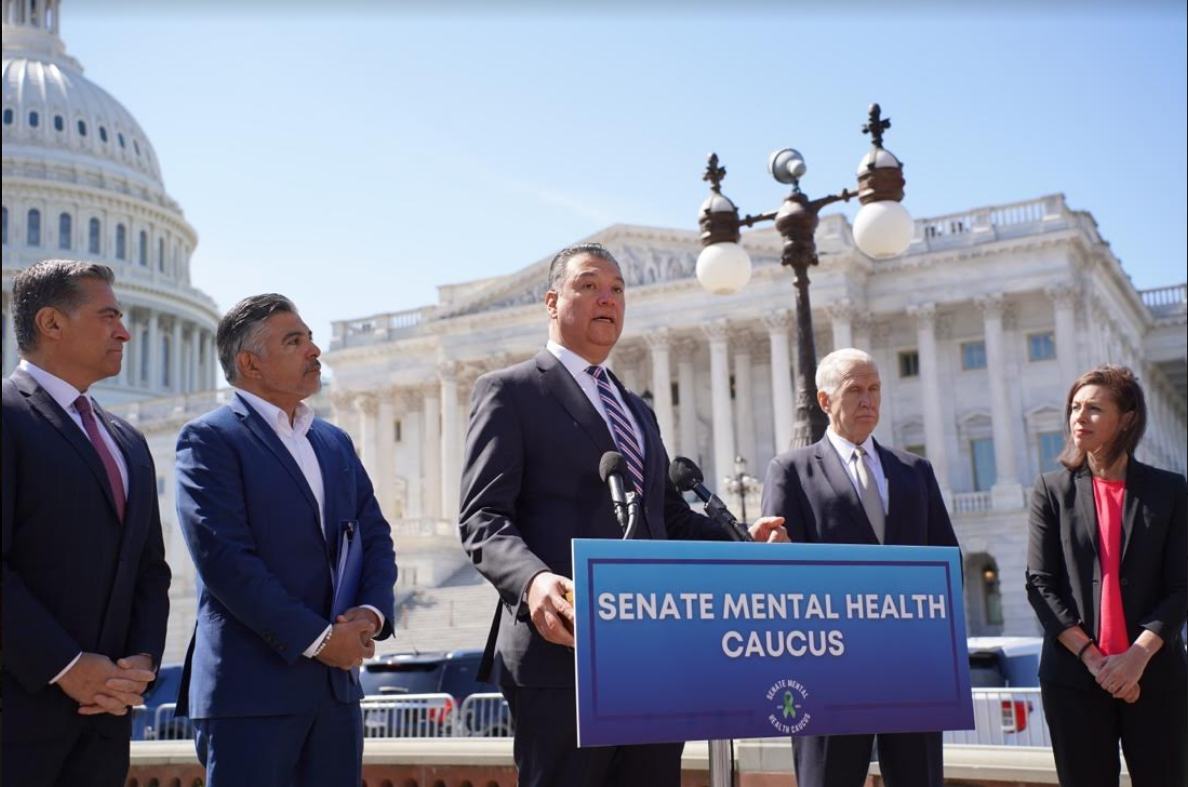
WASHINGTON — U.S. Sens. Alex Padilla (D-Calif.) and Thom Tillis (R-N.C.), joined by U.S. Rep. Tony Cárdenas (D-Calif.), Federal Communications Commission Chairwoman Jessica Rosenworcel and U.S. Secretary of Health and Human Services Xavier Becerra, introduced a measure on Thursday to improve the 988 Suicide and Crisis Lifeline.
Calls are currently routed to mental health professionals and local public safety officials based on the caller’s area code — even though, as the lawmakers and officials noted during their announcement — in many cases, the area code, especially for cell phone numbers, does not match the location from which they are calling.
Under the new proposal, Padilla said, “We’re going to be in a position to be able to provide care as quickly and as safely as possible.”
“In the same way that 911 calls in the case of an emergency are routed to local providers, local first responders, so ambulances can come out and help quickly when you call 911, 988 should be tied to a caller’s location, not their area code,” he said.
Calling Padilla, Tillis, and Cárdenas “great champions of mental health,” Rosenworcel noted, “that’s not our stock and trade” at the FCC.
“We are people who deal with technology and communications,” she said, “but we came to realize that we could work with Congress to make sure that everyone in this country who’s going through a crisis has someone to call and someone who can listen — and that’s why in 2022, we set up 988, the easy-to-remember three digit number for anyone who is in crisis.”
A press release from Padilla’s office explains the details for how the update to the 988 Suicide and Crisis Lifeline will work:
“The Notice of Proposed Rulemaking (NPRM) announced today seeks to address the discrepancies and inefficiencies of the current system by proposing the adoption of a rule that would require a georouting solution to be implemented for all wireless calls to the 9-8-8 Lifeline while balancing the privacy needs of individuals in crisis.
Georouting refers to technical solutions that enable calls to be directed based on the location of the caller without transmitting the caller’s precise location information. These solutions would permit wireless calls to the 9-8-8 Lifeline to be directed to nearby crisis centers based on factors such as the cell tower that originated the call rather than the area code of the wireless device used to place the call.”
The 988 Suicide and Crisis Lifeline offers LGBTQ-affirming counseling, which is accessible by pressing three.
A 2023 survey by the Trevor Project, which included more than 28,000 LGBTQ participants aged 13-24, found that 41 percent had seriously considered suicide within the past year and 56 percent wanted — but were unable to get — mental health care within the last year.
Congress
Nicole Berner becomes first LGBTQ judge on 4th Circuit
Berner becomes the 1st openly LGBTQ person to ever serve on the 4th Circuit & the 3rd LGBTQ woman to serve on any federal appellate court

WASHINGTON — Following the U.S. Senate’s 50-47 vote on Tuesday supporting her nomination, Nicole Berner will become the first LGBTQ judge to serve on the 4th U.S. Court of Appeals, which adjudicates cases appealed from courts in the Mid-Atlantic region.
An attorney who previously worked as general counsel for the Service Employees International Union and as a lawyer for Planned Parenthood, Berner is the 11th confirmed LGBTQ judicial appointee who President Joe Biden nominated.
The Biden-Harris administration has now confirmed as many queer jurists with lifetime tenure to serve on U.S. federal courts as former President Barack Obama did over the course of two terms in office.
“The civil rights community celebrates Nicole Berner’s historic confirmation to the U.S. Court of Appeals for the 4th Circuit,” Maya Wiley, president and CEO of the Leadership Conference on Civil and Human Rights, said in a statement.
“Ms. Berner is a brilliant lawyer who has defended and advanced our civil and human rights, including the rights of working people, reproductive rights and the rights of LGBTQ people,” she said. “Her commitment to equal justice is evidenced throughout her life and legal career, and we look forward to her service on the bench.”
“Ms. Berner also becomes the first openly LGBTQ person to ever serve on the 4th Circuit and just the third openly LGBTQ woman to serve on any federal appellate court in the nation,” Wiley said. “Her confirmation adds crucial lived experience to the court and sends a powerful signal to young LGBTQ lawyers, law students and other potential future judges that they belong on the federal bench.”
Democratic U.S. Sens. Ben Cardin and Chris Van Hollen of Maryland had supported Berner’s nomination.
“Nicole Berner has shown her outstanding qualifications and readiness to join the federal judiciary,” Cardin said. “Since we first recommended her to President Biden, we have been impressed with her spirit and expertise and her willingness to stand up for worker rights, families and underrepresented communities throughout her legal career.”
Van Hollen said, “For decades, Nicole Berner has represented working families and historically underrepresented communities. Her vast qualifications and accomplishments clearly show that she is dedicated to the rule of law, fairness and the principles of democracy — but more than that, her character has shown her to be a champion of those too often left behind by the legal system.”
-

 Arts & Entertainment18 hours ago
Arts & Entertainment18 hours agoLesbian comic/activist Robin Tyler gets a long overdue ‘Outstanding’ Netflix spotlight
-

 Los Angeles County3 days ago
Los Angeles County3 days agoDowney official who banned Pride flag elected to lead influential national Latino political group
-
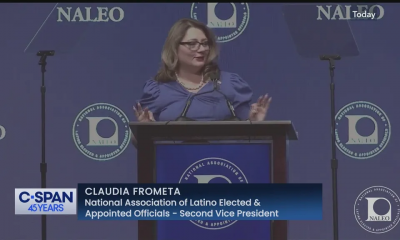
 Los Angeles County2 days ago
Los Angeles County2 days agoHONOR PAC launches petition to oust NALEO’s new president over Pride flag vote
-
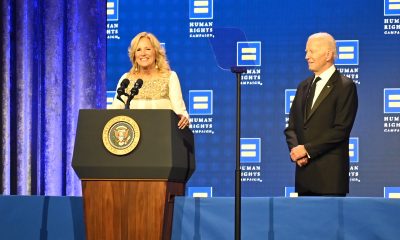
 The White House5 days ago
The White House5 days agoJill Biden to host White House Pride celebration
-

 Television3 days ago
Television3 days agoPBS ‘Disco’ is a Pride party you don’t want to miss
-

 Arts & Entertainment4 days ago
Arts & Entertainment4 days agoNetflix’s ‘Outstanding’ Documentary Reveals Queer Comedy Icons’ Impact on LGBTQ+ Rights
-
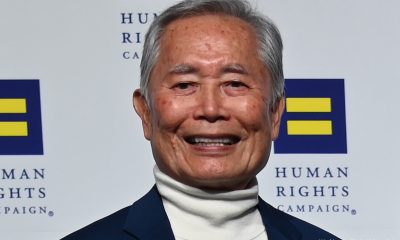
 History4 days ago
History4 days agoLGBTQ+ History Archive Gains Momentum: Personal Stories Project Partners with George Takei
-

 Africa4 days ago
Africa4 days agoProminent South African activist elected to country’s parliament
-

 a&e features4 days ago
a&e features4 days agoGMCLA’s ‘Solid Gold’ Gala: Honoring LGBTQ+ Champions with Iconic Diva Tributes
-

 Autos3 days ago
Autos3 days agoAll charged up: BMW i7 xDrive6









